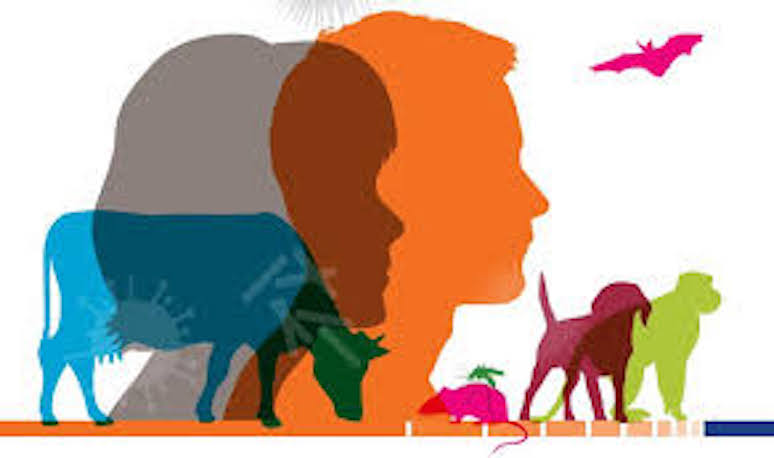One Health is the concept that human, animal, environmental/ecosystem, and atmospheric health are linked. It is a relatively new term but an ancient concept intuitively understood by indigenous peoples around the world. The One Health concept provides a useful framework for analyzing and addressing complex, interdisciplinary problems such as foodborne and waterborne illnesses, antimicrobial resistance, food security, and even climate change.
We live in a microbial world. We need to learn how to live better in it. We need to learn how to sustainably co-exist with the microbes living in us, on us, and around us.
For example, over 7 billion humans and almost 30 billion domesticated animals produce trillions of kilograms of fecal matter that contain billions of microbes. Each year, the massive amounts of fecal matter produced could fill an estimated 1.6 million Olympic-sized swimming pools. According to the World Bank(1), over 2 billion people don’t have access to basic sanitation systems, and almost 9 million of them practice open defecation. Open defecation, as the name suggests, means squatting and defecating out in the open. Many developing countries lack basic sanitation systems for human fecal matter, much less for animal fecal matter which makes up 80 percent of the total fecal matter produced.
Fecal matter adversely affects human, animal, and environmental/ecosystem health by contaminating soils, crops, and waterways and causing foodborne and waterborne illnesses. Diarrheal illnesses are the second leading cause of death in children under 5 years, causing 525,000 deaths each year.(2) These diseases could be prevented with adequate sanitation, hygiene, and clean water. In other words—basic public health measures.
Unfortunately, countries that lack these basic provisions often use antibiotics as a substitute by making them readily available over-the-counter to anyone who can pay for them. Even worse, many people don’t have access to healthcare and rely on antibiotics for any sniffle or belly ache they might have. All of this indiscriminate use contributes to the worsening crisis of antimicrobial resistance.
Antibiotics are the foundation of modern medicine and have saved countless lives. Without safe and effective antibiotics, many of the medical treatments that we take for granted such as elective surgeries and cancer chemotherapies become too dangerous to do because the risk for infection becomes too great. But many bacteria are acquiring antibiotic resistance genes making them impervious to the effects of antibiotics, thus threatening the practice of modern medicine.
Many antibiotics are derived from soil microbes, and for many years, scientists believed that soil microbes used antibiotics as a form of chemical warfare against each other. But recent research of the planet’s soils suggests something far more profound.
Most soil microbes cannot be cultured in laboratories for a variety of reasons, so nobody really understands what exists in the soil. Some scientists came up with a clever strategy to extract DNA directly from the soil without knowing from which microbes the DNA originated from. Nevertheless, the findings were stunning. Scientists found antibiotic resistance genes everywhere—in the Arctic, in the Antarctic, and in other places that have never received human antibiotic exposure. Not only were antibiotic resistance genes everywhere, but they also appeared to be ancient. Microbes seem to use minute amounts of antibiotics as a form of communication with each other and not as a form of chemical warfare. Scientists coined the term, “the global resistome,” to describe the global, environmental nature of antimicrobial resistance.
Our widespread use of antibiotics in humans, animals, and agriculture as well as the massive amounts of fecal material contaminating the environment appears to be changing the “global resistome” and the micro-ecology of the planet in ways we don’t fully understand. We’re making it difficult for the soil microbes to communicate with each other, so they are sharing resistance genes with each other much faster than we can develop new antibiotics.
We need to start working with Nature rather than against it. We are losing the battle, and many people are dying from antibiotic resistant infections as a result.
So how might we work with Nature?
The natural foes against bacteria are tiny viruses called bacteriophages (aka “phages”). Bacteriophages were discovered in the early 20th century by Frederick Twort, a British bacteriologist, and by Felix d’ Herelle, a French physician.(3)
Antibiotics are relatively easy to use, akin to the shotgun approach to medicine – you don’t need to know exactly what bug you are treating to treat the infection. Unfortunately, since antibiotics usually have a broad spectrum of action, good bacteria are often killed off along with the bad bacteria. This feature has had negative unintended consequences.
Billions of microbes live in us and on us. They are as important for our health and well-being as any human organ. In his book, Missing Microbes, Dr. Martin Blaser, a physician and microbiologist,(4) argues that antibiotics have had a deleterious impact on public health by contributing to the obesity epidemic, the food allergy epidemic, and possibly even some cancers, among other maladies.
Bacteriophages, by contrast, are highly specific. They only attack the bacteria to which they are targeted against. This specificity requires better diagnostic capabilities than are currently available for widespread clinical use. Also, the technology for identifying, isolating, and developing phages as antibacterials has not changed since the early 20th century. Much more research and development needs to be done with them.
Nevertheless, there have been some important breakthrough cures of multi-drug resistant infections using bacteriophage therapy.(5) Dr. Steffanie Strathdee has written and spoken about her experience saving her husband’s life with bacteriophages in her book, the Perfect Predator(6) and her TEDx talk.(7) Phages are now being sought after by people with cystic fibrosis and antibiotic resistant infections.(8)
Microbes are contributing to climate change. Microbes in manure create methane and nitrous oxide, greenhouse gasses more potent than carbon dioxide. In addition, cattle, buffalo, goats, and sheep digest their feed in their rumens, their digestive tracts, in which bacteria decompose and ferment feedstuff, producing methane as a by-product. Globally, livestock produce about 14.5 percent of anthropogenic greenhouse gas emissions.(9)
Agriculture is the foundation of civilization. It is in the unique position of contributing to climate change and being threatened by it. Without agriculture and the food security it provides, civil society breaks down. For the past 10,000 years, during the geological Holocene era, the planet’s climate has been remarkably stable and mild, with the exception of the Little Ice Age, during the 17th, 18th, and 19th centuries, during which the planet’s climate cooled, resulting in crop failures, famines, and wars.(10) According to Philipp Blom, author of Nature’s Mutiny, witch trials and murders increased after severe weather and crop losses. Somebody had to be blamed for the divine punishment of famine; usually it was poor, elderly women. Now, in contrast to the Little Ice Age, the planet’s climate is warming and deviating above the Holocene baseline, threatening agriculture and food security through heat, drought, and severe storms. The impact of climate change on agriculture is thought to have contributed to the conflict in the Middle East and mass migration.(11) In essence, climate change means change from the Holocene baseline. Humanity’s goal must be to keep the planet’s climate as close to the Holocene baseline as possible to ensure the continuation of agriculture, food security, and civilization.
Sustaining civilization requires recognizing the interconnectedness between global human and animal health, agriculture, the environment, and climate. One Health provides an important framework to identify and address these interconnections. We live in a microbial world. Our health relies on microbes, but they can also make us, our environment, and atmosphere sick. To save civilization, we must embrace a One Health approach to address the global challenges of the 21st century and beyond.
References for this article can be seen at the Footnotes 3 page on this website (link will open in a new page).


